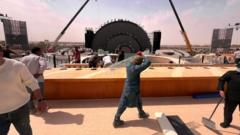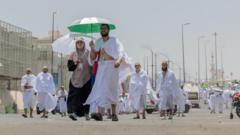Reports from Human Rights Watch and FairSquare indicate a concerning rise in deaths of migrant workers in Saudi Arabia's construction sector, attributed to unsafe working conditions. Advocacy groups urge reforms and better protections for laborers, emphasizing inadequate investigations and compensation for fatalities linked to the upcoming 2034 World Cup preparations.
Rising Death Rates Among Migrant Workers in Saudi Arabia Amid World Cup Preparations

Rising Death Rates Among Migrant Workers in Saudi Arabia Amid World Cup Preparations
Human rights organizations highlight increasing fatalities of migrant construction workers in Saudi Arabia, calling attention to safety issues as the nation gears up for the 2034 World Cup.
Human rights groups are issuing urgent warnings about a troubling increase in deaths among migrant construction workers in Saudi Arabia, particularly as the nation prepares for the 2034 World Cup. Organizations such as Human Rights Watch and FairSquare have conducted studies revealing that many migrant deaths occur due to preventable workplace accidents but are often misclassified as dying from natural causes, depriving the workers’ families of compensation.
Minky Worden, director of Global Initiatives at Human Rights Watch, stressed the alarming potential for an increase in fatalities as millions of migrant laborers work to construct necessary infrastructure, including 11 new stadiums, extensive transportation systems, and a vast number of hotel accommodations. The current crisis echoes past concerns raised during the Qatar World Cup in 2022, revealing an ongoing pattern of neglect.
The recent concerns coincide with a visit from FIFA President Gianni Infantino and former U.S. President Donald Trump, attending a U.S.-Saudi investment forum. Despite FIFA’s assurances of a commitment to human rights, reports suggest that the organization has not adequately addressed the lessons learned from past migrant worker fatalities.
Detailed investigations are hindered by the Saudi government's limited transparency and the prohibition of labor unions, making it difficult to access accurate statistics about migrant deaths. Human Rights Watch has managed to connect with families of deceased workers who fell victim to various workplace incidents, including falls and exposure to extreme heat.
In March, the first reported death linked directly to World Cup construction efforts was of a Pakistani foreman in Al Khobar. While the Saudi government claimed improvements in occupational health and safety since 2018, labor unions argue that incidents of preventable accidents have risen due to systemic failures.
Organizations like FairSquare also criticize the medical infrastructure in Saudi Arabia for rarely conducting autopsies on deceased migrant workers and for the lack of protection afforded to a vulnerable workforce. James Lynch, FairSquare's co-director, emphasized the dire conditions faced by young migrant laborers who often support families back home without robust systems in place to safeguard their rights or well-being.
In response to mounting pressure, FIFA announced plans to implement a dedicated workers' welfare system to ensure respect for labor rights during construction and service operations related to the World Cup. However, Human Rights Watch maintains that details surrounding these initiatives remain vague and unverified.
Finally, advocacy groups call on Saudi authorities and FIFA to thoroughly investigate all migrant worker deaths and ensure that families receive appropriate support and compensation for their losses as the world turns its gaze to the kingdom for the upcoming tournament in 2034. The issue raises critical questions about ethical responsibilities in international sporting events and the treatment of those who contribute significantly to their realization.
Minky Worden, director of Global Initiatives at Human Rights Watch, stressed the alarming potential for an increase in fatalities as millions of migrant laborers work to construct necessary infrastructure, including 11 new stadiums, extensive transportation systems, and a vast number of hotel accommodations. The current crisis echoes past concerns raised during the Qatar World Cup in 2022, revealing an ongoing pattern of neglect.
The recent concerns coincide with a visit from FIFA President Gianni Infantino and former U.S. President Donald Trump, attending a U.S.-Saudi investment forum. Despite FIFA’s assurances of a commitment to human rights, reports suggest that the organization has not adequately addressed the lessons learned from past migrant worker fatalities.
Detailed investigations are hindered by the Saudi government's limited transparency and the prohibition of labor unions, making it difficult to access accurate statistics about migrant deaths. Human Rights Watch has managed to connect with families of deceased workers who fell victim to various workplace incidents, including falls and exposure to extreme heat.
In March, the first reported death linked directly to World Cup construction efforts was of a Pakistani foreman in Al Khobar. While the Saudi government claimed improvements in occupational health and safety since 2018, labor unions argue that incidents of preventable accidents have risen due to systemic failures.
Organizations like FairSquare also criticize the medical infrastructure in Saudi Arabia for rarely conducting autopsies on deceased migrant workers and for the lack of protection afforded to a vulnerable workforce. James Lynch, FairSquare's co-director, emphasized the dire conditions faced by young migrant laborers who often support families back home without robust systems in place to safeguard their rights or well-being.
In response to mounting pressure, FIFA announced plans to implement a dedicated workers' welfare system to ensure respect for labor rights during construction and service operations related to the World Cup. However, Human Rights Watch maintains that details surrounding these initiatives remain vague and unverified.
Finally, advocacy groups call on Saudi authorities and FIFA to thoroughly investigate all migrant worker deaths and ensure that families receive appropriate support and compensation for their losses as the world turns its gaze to the kingdom for the upcoming tournament in 2034. The issue raises critical questions about ethical responsibilities in international sporting events and the treatment of those who contribute significantly to their realization.





















